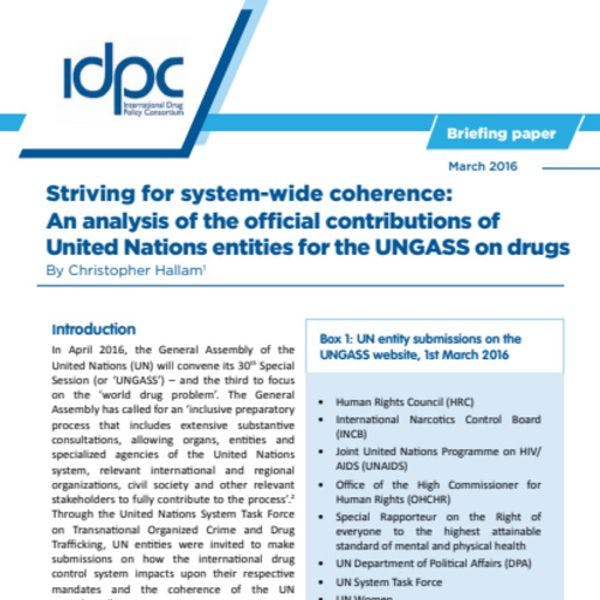Lutter pour une meilleure cohérence du système onusien: Une analyse des contributions des agences de l’ONU pour l'UNGASS
Ce document d'information de l’IDPC examine plusieurs thèmes clés émergeant des contributions des 15 entités de l'ONU pour l’UNGASS. Pour en savoir plus, en anglais, veuillez lire les informations ci-dessous.
Abonnez-vous à l'Alerte mensuelle de l'IDPC pour recevoir des informations relatives à la politique des drogues.
In April 2016, the General Assembly of the United Nations (UN) will convene its 30th Special Session (or ‘UNGASS’) – and the third to focus on the ‘world drug problem’. The General Assembly has called for an ‘inclusive preparatory process that includes extensive substantive consultations, allowing organs, entities and specialized agencies of the United Nations system, relevant international and regional organizations, civil society and other relevant stakeholders to fully contribute to the process’. Through the United Nations System Task Force on Transnational Organized Crime and Drug Trafficking, UN entities were invited to make submissions on how the international drug control system impacts upon their respective mandates and the coherence of the UN more broadly.
By 1st March 2016, 15 UN entities had contributed documents to the preparatory deliberations, which have been uploaded onto the official UNGASS website.
This briefing paper examines several of the most prominent themes to emerge from the contributions of these UN entities, and their progress or otherwise into the UNGASS debates and the draft UNGASS Outcome Document.
Keep up-to-date with drug policy developments by subscribing to the IDPC Monthly Alert.
Téléchargements
Sujets
Régions
Profils associés
- International Drug Policy Consortium (IDPC)
